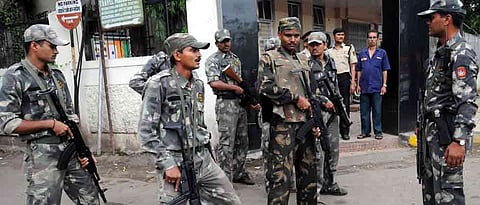

Pune: The brutal 26/11 Mumbai attack was the first armed assault of its kind for which Maharashtra police was not prepared. Now, 10 years after the 60-hour attack of 2008, officials say the State is better prepared and organised. A layered surveillance and security architecture has been put in place.
A senior police officer from Pune City Police told Sakal Times, “We have come a long way since the 2008 attack. But still a lot has to be done for utilising available resources, besides keeping pace with the changing technologies.”
After the 26/11 terror attack, the Maharashtra police brought in several changes, the most important being setting up the Maharashtra Intelligence Academy (MIA) on the SRPF campus in Pune in 2009 to train intelligence personnel, establishing Quick Response Teams (QRT) armed with sophisticated assault weapons to thwart any terror attack and the setting up of Anti-Terrorism Cell (ATC) in every police station for collection of grass roots-level intelligence. These measures have been replicated across the State. For Mumbai and coastal areas, some specific measures have been implemented, like setting up marine police units and installing radars.
Maharashtra Intelligence Academy (MIA)
The MIA, located in Wanawadi, trains police personnel in intelligence gathering and counter-terrorism. The personnel of the Special Branch units, which act as the intelligence wing for the police commissionerate, are trained here in gathering local intelligence. The new recruits of the State Intelligence Department (SID) are also trained here in spy tradecraft. The academy also runs refresher courses for in-service personnel.
“Information is the key in preventing any terror attack. Therefore, we are training personnel in languages spoken and understood by people in the State. Urdu and Bangla languages are also taught, besides other techniques which cannot be shared publicly. I want to say that we are the first to adapt new syllabus for the new recruits or in-service personnel,” said an officer from the MIA.
Quick Response Team (QRT)
The Pune City Police have formed a 100-member strong Quick Response Team (QRT), its commando unit, to deal with any kind of terror strike in the city. The QRTs operate under the aegis of Special Branch. The QRT is headed by a police inspector and divided into 13 teams. Every three months, jawans undergo a physical proficiency test (PPT) and constables below the age of 30 are selected for five years. They are trained to handle modern weapons such as Glock pistols, MP5 and AK-47 rifles at high and low frequency firing. The teams have been equipped with sophisticated bullet-proof vehicles, SUVs, light vans and adequate number of bullet-proof jackets. The QRT has received training from the elite National Security Guard (NSG) and Force One commandos.
“The QRTs are stationed round-the-clock in shifts at different locations every day. Learning from the 26/11 attack when there was difficulties in getting topography of Taj Hotel, the QRTs have been taken for mock-drills at over 100 sensitive locations/ establishments in Pune. They have made videos for practice and each commando knows inside out of the premises,” an officer added.
Anti-Terrorism Cell (ATC)
Another major change was the setting up of the Anti-Terrorism Cell (ATC) in every police station especially in cities. The High Level Enquiry Committee probing the 26/11 attack had noted that there is a tendency on the part of uniformed police to depend entirely on outside inputs for terrorism-related intelligence. As a matter of fact, the local police themselves are in a better position to collect local intelligence since they are in daily touch with their area.
Hence, in Mumbai, Pune and other cities, every police station has got 3 to 6 police personnel under ATC to gather grass roots-level intelligence on terrorists. A set of guidelines has been issued to ATC staff to follow religiously and generate various kinds of intelligence. They keep a tab on suspicious persons and organisations under their jurisdiction.
The policemen collect basic intelligence and cull information, including keeping track of SIM card sales by vendors and realty deals records from agents, checking on visitors to religious places, keeping track of known terrorists and sympathisers and more.
